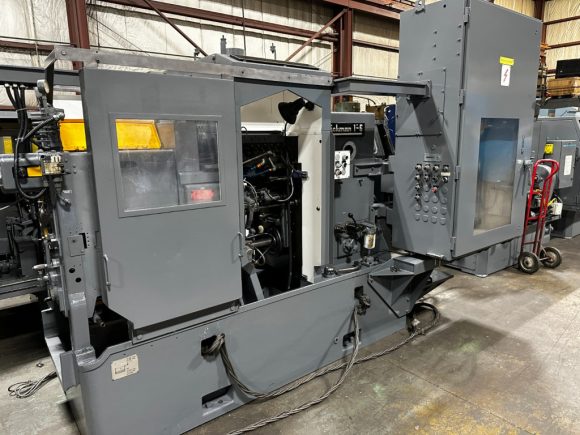Is the traditional automatic screw machine business in a coma?
It probably already is in its death throes, which does not mean Wickmans, Acmes, Davenports, and New Britains are no longer useful.
Judging by the sales of Graff-Pinkert’s Wickman spare parts business in 2023, people are still running the machines quite hard. It is hardly a growth business, but it has worked into a useful segment of a viable job shop.
Where do cam multi-spindles fit, and how do you overcome their numerous obstacles?
The most significant impediment is the challenge to find multi-spindle operators and setup people in a world that rarely teaches young people a strong work ethic, much less how to use a screwdriver. Until high schools begin attracting kids into traditional vocational classes with well-schooled professional teachers, hopefully partially provided by local shops, this will be a significant problem.
As colleges continue to raise tuition and many students are thinking about an option that pays well and offers long-term work and middle-class wages, there will be potential screw machine operators. Immigrants also offer a potential trove of workers looking for a welcoming place.
Shops that put up a help wanted sign and depend on word-of-mouth are failing to replace aging and mediocre workers. Those who show the same initiative for obtaining workers as they do in obtaining customers can find workers and grow. We have seen it in a local shop that has quadrupled its size in just a few years. They hit every local job fair, make themselves quite visible locally, and continue to grow rapidly. It is a family business with two sons leading different divisions, including a 50,000-square-foot Brown and Sharpe and New Britain shop.
It can be done.
People of color and women do not see the opportunity of the machining business. The percentage of college graduates is now 60% women and growing each year. Men are rejecting college, but still generally forsaking the precision machining world, except where they see the option beats a desk or a screen.
Another big issue is wages. I do not see a clear answer to this in a brutal world market except raising wages to better than the competition.
Swiss-type screw machine work has thrived in recent years, partly because lot sizes have shrunk but also because Brown and Sharpe and multi-spindle operators have been disappearing.
There are still substantial lot sizes that require multi-work for those who have the skills and the machines. Fittings, automotive, military, even firearms are excellent fits. The attraction of China has diminished. India has a place, but its quality tends to be suspect.
As Graff-Pinkert continues to get involved in helping more precision machining firms buy and sell companies, we see the key value components as a solid customer base and a skilled and loyal workforce. Companies that pay well, make money consistently, and have customers who continually come back without checking each price point sell fairly easily.
Screw machine companies have their place. Using $2 million INDEX or Schutte CNC multi-spindle might be the path to success but an older well-maintained Wickman or Acme can still turn a buck as well.
Question: Are precision machining workers underpaid?


7 Comments
Yes they are. We have to pay what it takes to keep them here and to attract talent.
Yes.
Just as a machine shop owner doesn’t want to turn away business, so does the education system not want to encourage blue collar careers without collage. Students are indoctrinated to go get a degree. Make the universities rich, own a student loan. How do you change that?
Thanks for commenting Fred. Yes, that is true about colleges.
But one of the ways you change that is by answering the question we asked.
Pay more money to people running multi-spindles, and tell the world what you’re paying!
That is the first step to changing the status quo.
The current day wage scale is higher than Snoop Dogg. When I started my current job twenty years ago, I’d been honing my skills for 19 years, and $20 per hour was that ceiling I finally broke. Now, our chip spinner is compensated better, like 10% better. Putting it into context, with that example, plus a host of other non-skilled labor positions, skilled set up operators should be in $40-50 range. Hint, I’m not…
* I must amend to add; in my experience, THE BOTTOM END of wage scale has risen dramatically* i.e. socialistic wages, all are one and one are all.
Going the extra mile, giving 100% effort helps wages too, with a long term mindset. Its all intertwined…! And word of mouth is the best way to let people know.